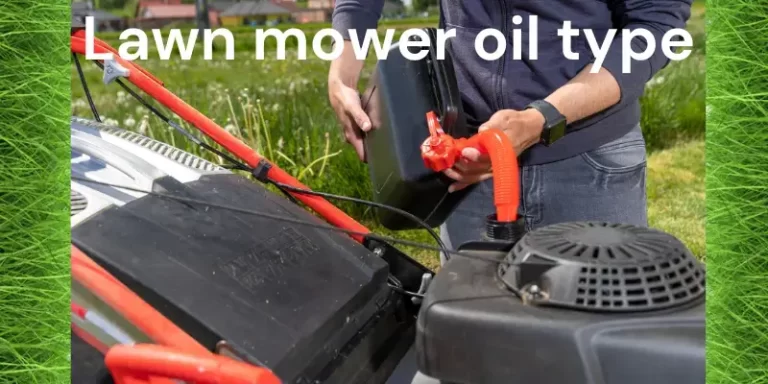How to Protect Your Lawn During the Winter?: Essential Care Tips
As the winter is at its peak, with cold breezes outside, our thoughts often turn to cozy firesides and warm blankets. the gardening freaks are worrying about their lawn health which is maintained for the whole year with a lot of sincere efforts.
The question “How to Protect Your Lawn During the Winter?” always tickles my mind and I am going to answer this question with my experiences and knowledge, where you can maintain your lawn but also ensure the health and vitality of your grass for the season to come.
To effectively protect your lawn during winter, consider it an investment in your garden’s future. Start by applying nitrogen-rich fertilizer in the fall to build up carbohydrate reserves in the grass. In your last mowing before winter, cut the grass shorter to enhance air circulation and reduce disease risk. Manage fallen leaves carefully; while they can be beneficial for mulching, too many can suffocate your lawn. Remember, a little effort in winter lawn care goes a long way in ensuring a lush, healthy garden come spring.
Benefits of Snow for Your Lawn
Snow is often seen as a foe to the green grass, but in fact, it plays a friendly role by insulating your lawn with a natural blanket. The best thing is that it allows air to pass through even inside a white cover, your lawn still breathes, receiving the precious oxygen it needs.
Surprisingly, the ice is a real threat, not the snow. Ice can cut off the supply of air and is responsible for damaging the grass, but a snowy cover generally keeps your lawn safe and snug.
Maintaining a Lawn during Winters: Tips and Techniques
Maintaining a lawn during winter is not an easy task especially when you are surviving the chilling cold temperature. There are a few tips and techniques to maintain and upkeep your lawn during the snowy season, and be ready for the spring season.
These tips and techniques can vary depending upon factors like, the climate of a particular region where you are living, and, the type of grass also matters. But some general principles to protect your lawn are:
Supply Adequate Nitrogen in the Fall
Preparing your lawn for winter starts in the fall. Like bears storing food for hibernation, grass plants must stock up on carbohydrates. This energy reserve is achieved through fall fertilization.
Applying a nitrogen-rich fertilizer in the fall helps your grass store essential nutrients, ensuring it has enough energy to survive the winter months. Grasscycling and mulching your clippings back into the lawn can also provide a natural, nutrient-rich supplement.
Cutting Grass Shorter in Final Cut
When you are going to mow your lawn for the last time before starting the winter season. Always cut it short by lowering your lawnmower deck. It helps improve air circulation during the snowfall. Because long grass might stop the air circulation during the heavy snowfall.
Additionally, a shorter lawn also reduces moisture retention, ultimately reducing the risk of grass diseases.
Use of Fallen Leaves in Winters
The autumn leaves can be more than just a chore. Mulching leaves not only provide organic nutrients to your lawn but moderation is key.. A thick layer can smother your grass, so do not leave too much leaf in the lawn as winter sets in.
Aerating the Lawn Before Winter
Aerating a lawn is just like giving a deep breath of fresh air to your grass. In this process, gardeners make small holes in the soil, which allow water, air, and nutrients to penetrate inside the grass. It helps in soil compaction and increases the growth of grass.
Aerating in the fall before winter is beneficial for your lawn to survive during the harsh cold weather and protect it from being completely damaged.
Use of Pre-Emegrents Before Starting of Winter Season
Gardening professionals use pre-emergents during the spring, but applying these in the fall is very beneficial. This can prevent the emergence of certain winter weeds and help your lawn maintain its integrity throughout the colder months.
Cleaning the Lawn
Lastly, don’t forget to clean your lawn. Removing leaves, sticks, and other debris is important for preventing disease and ensuring your grass has access to sunlight and air. This simple step in winterization can make a significant difference in the health of your lawn come spring.
Avoiding Salt Damage
One of winter’s necessary evils, salt used for de-icing, can wreak havoc on your lawn. Salt leaches into the soil, creating a condition known as physiological drought, which impedes nutrient uptake and leads to bare spots. To protect your turf, opt for sodium chloride alternatives like calcium chloride for de-icing. Also, avoid piling shoveled snow, potentially laden with salt, onto your grass. After the thaw, watering your lawn can help flush out any residual salt.
Protect Lawn from Salt Damage
People are using salt for ice-melting, it can wreak havoc on your lawn. Salt absorbs into the soil, creating a physiological drought, which impedes nutrient uptake and leads to bare spots. To Protect the turf, use sodium chloride alternatives like calcium chloride for de-icing. Also, avoid piling shoveled snow. After clearing snow, use water to flush out any residual salt from your lawn.
Fertilizing in Winter
If the ground isn’t frozen, winter presents an opportunity to amend your soil. Sweetening acidic soil with lime, based on a soil test, can prepare your lawn for spring. Additionally, applying a slow-release winterizing fertilizer can nourish your lawn, and increase robust growth in the spring.
Minimize Soil Compaction to prevent lawn
Heavy snow and foot traffic can compact soil, reducing its ability to nourish grass. Avoid piling snow on your lawn and try to minimize walking on the grass. Spreading snow evenly can prevent compaction and speed up melting, reducing the risk of mold formation.
Mowing Considerations
If you still need to give your grass its final cut before the cold snap, it’s still possible. Mowing your grass shorter in winter can prevent rodent infestation and snow mold. However, avoid mowing wet grass as it can damage the turf.
Raking and Removing Debris
After winter, it’s important to clear debris like fallen branches from your lawn. This prevents drainage issues, soil compaction, and potential damage to the grass. Regular raking can also help manage wet leaves and other organic matter.
Seeding and Sodding
Winter can be a time to repair bare patches. Laying sod or overseeding with winter-resistant grass seeds can protect your lawn from erosion and compaction. It’s also a proactive step for a lush lawn in spring.
Watering Your Lawn in Winter
Dormant grass still needs water, especially during dry spells. Watering deeply when the temperature is above 40°F can prevent dehydration and protect against certain pests attracted to dry turf.
Weeding During Winter
Mild, rainy winter days often lead to weed growth. It’s the perfect time to remove them before they take hold. Applying a pre-emergent weed killer when the ground isn’t frozen can also prevent springtime weed problems.
Frequently Ask Questions (FAQs)
How does winter weather affect the condition of my lawn?
Winter weather, such as extreme cold or frost, can cause the grass to become less resilient and more susceptible to damage.
What can I do to protect my lawn from the harsh winter weather?
To protect your lawn during the winter, you can keep the grass at a slightly higher height by adjusting the height of your mower.
Can heavy foot traffic on the lawn cause damage during the winter?
Yes, heavy foot traffic, especially across frozen or frost-covered grass, can cause wear and tear that may result in the grass being less resilient when spring arrives.
Is it important to continue feeding my lawn during the winter months?
Yes, it’s important to feed your lawn during the winter to give it the nutrients it needs to remain healthy and emerge strong in the spring.
What is the best height to mow the grass during the winter?
It’s recommended to lower the height of your mower during winter to prevent the grass from matting down under possible snow cover.
Should I aerate my lawn before the winter months?
Yes, aerating your lawn before the winter allows for better water and nutrient absorption, leading to a healthier lawn when spring arrives.
How can I keep my lawn healthy through the winter?
By following proper winter lawn care instructions and providing the necessary care, you can make sure your lawn remains in good condition.
Does early winter or late winter weather have a different effect on my lawn?
Yes, early winter weather can cause different effects on your lawn compared to late winter weather, so it’s important to adapt your lawn care routine accordingly.
What family of grasses are less resilient against winter conditions?
Some grass types, such as warm-season grasses, may be less resilient to winter conditions compared to cool-season varieties.
Can excessive snow or ice accumulation harm my lawn?
Excessive snow or ice accumulation on your lawn can cause damage, so it’s important to protect your grass from these elements.
Conclusion:
By following these winter lawn care essentials, you’re likely to prevent winterkill and other common cold weather lawn issues. While lawn care is often associated with warmer months, winter maintenance is just as important. It ensures that when spring arrives, your lawn is healthy, robust, and ready to flourish.
Protecting your lawn during winter might require some effort, but the rewards are well worth it. A bit of care during the colder months goes a long way in ensuring a vibrant and healthy lawn in the spring. Important to note that your lawn is not just a summer asset; it’s a year-round commitment.

About Naveed A Hashmi
In my childhood, I used to see my parents while working in the land, for these reasons today I have been serving the same as our own tradition and culture. I thus love to stay in it, because I want to learn something advanced and new so that I may improve my farm’s contour and help others with my experience.







